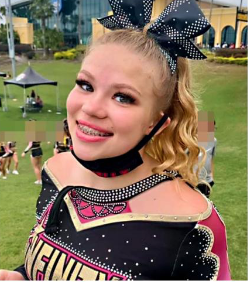Sentencing a teenage killer: the murder of Tristyn Bailey

Tristyn Bailey
April 5, 2023
Sunday, May 9, 2021, was a tragic Mother’s Day for Florida mother Stacy Bailey. She awoke to find that only four of her five children had made it home safe the night before. Bailey spent what should have been a joyful holiday scouring the county with law enforcement, desperately searching for any sign of her youngest child. At 6:06 p.m., her daughter’s body was found, lying lifeless, near a retention pond. Tristyn Bailey, a 13-year-old girl, had been brutally stabbed 114 times.
Tristyn Bailey’s killer was one of her classmates, 14-year-old Aiden Fucci. Two years have passed since the crime was committed. In February, Fucci chose to plead guilty. This past week, he received his sentence: life in prison with a review in 25 years.
Fucci, now 16, was tried as an adult. Nevertheless, the judge had to take Fucci’s age into consideration when delivering the sentence. This is because there are many laws in place to protect children that are being tried in adult criminal court. One notable difference is that children can not receive the death penalty.
Dr. Alesa Liles is an associate professor of criminal justice at GC. She explained how this protective measure came to exist. Specifically, major court cases throughout the last two decades have led to these restrictions in sentencing and have forced judges to take a child’s age and lack of development into consideration.
“In 2005, the Supreme Court decided that juveniles were ineligible for the death penalty [Roper v. Simmons] ,” Liles said. “So, if a kid committed a death-eligible offense, in most states, that meant they would receive an automatic life-without-parole sentence because that is how the laws are written. That was the case up until 2012. In 2012, the Supreme Court said kids cannot receive mandatory life without parole. They must be given a ‘meaningful opportunity for release’ [Miller v. Alabama].”
Based on the nature of Fucci’s crime, he was set to be tried in adult court rather than as a juvenile. In 25 years, a judge will review his sentence, thus fulfilling the obligation to provide “meaningful opportunity for release.”
Dr. Carrie Cook, GC professor of criminal justice, also referenced Roper v. Simmons and Miller v. Alabama when explaining why the United States judiciary chose that death row should not be an option for minors.
“The Supreme Court has said, in two different cases, that we are ethically required to consider how juveniles are different from adults,” Cook said. “The Supreme Court in Roper said states aren’t really doing this [juvenile death penalties] anyway. They’re not sending people to death row who were juveniles when they committed their crime. So, they’re recognizing that as a practice that our society isn’t really comfortable with.”
Death row alone is a point of controversy among many Americans. Some believe the practice is a suitable punishment for individuals who have committed dark and heinous crimes. Others see it as a practice that strips people of their right to life and ought to be abolished.
Chad Helton is a junior at GC double majoring in criminal justice and political science. He is against capital punishment in general, so he is certainly against any notion of putting minors on death row. Helton explained that he, ethically, finds Fucci’s life sentence to be appropriate, considering the crime. But he also raises concerns about over-sentencing minors as adults.
“I mean, he [Fucci] premeditatively killed this girl, so in this case specifically, I think it was a very fair sentencing to do life with a 25-year examination,” Helton said. “If it was something minor, like drug possession or something like that, I don’t think we should be doing life without parole or life with parole. The sooner you insert a child into the prison system rather than the juvenile delinquent system, it’s going to further impair them from developing any kind of behavior fixing or behavior corrections.”
Furthermore, according to Cook, Florida is the leading state in the nation in terms of trying minors as adults.
“It’s an interesting case because Florida leads the nation with waivers to adult court,” Cook said. “It’s, like, almost double or more than double the second-leading state.”
The potential for reform in the United States prison system has long been a topic of political debate. However, in the past 20 years, Americans have seen two major cases go through the Supreme Court that have been making an effort to protect children from being treated with overt harshness or scrutiny by the legal system.



